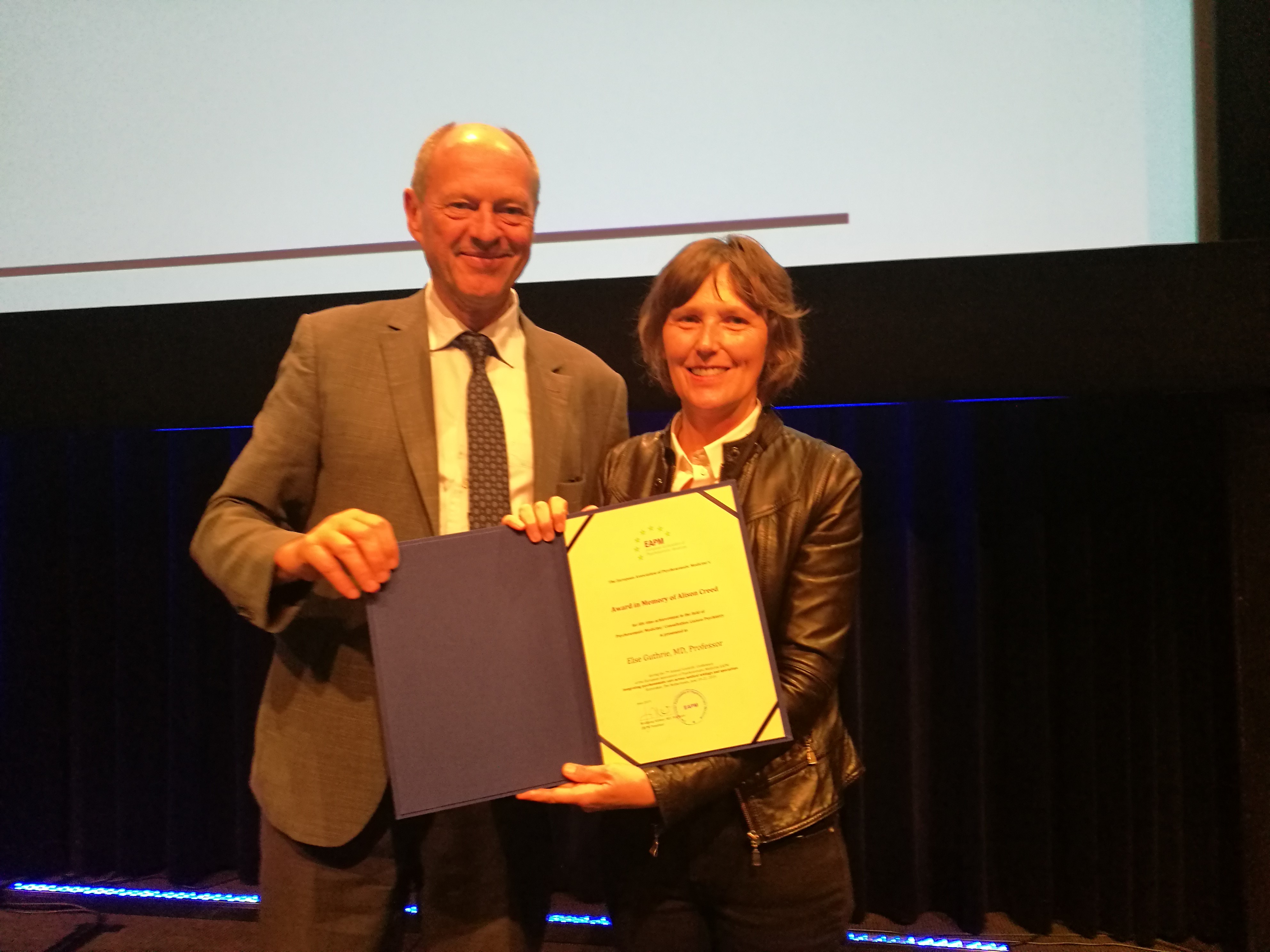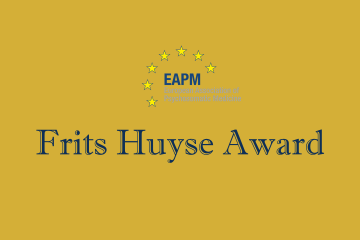
Prof. Wolfgang Söllner and Prof. Else Guthrie
Read the laudatio written by Prof. Francis Creed
Interview with Professor Else Guthrie on the occasion of winning the 2019 Alison Creed Award
Interview by Meike Shedden Mora, PhD
May 26, 2019

Else Guthrie
Professor Guthrie, congratulations for receiving the 2019 Alison-Creed-Award of the EAPM for your outstanding contribution to Consultation Liaison Psychiatry. As a junior researcher in the field of psychosomatic medicine, I feel honoured to have the opportunity to ask you some questions regarding your work, your career, and your personal vision for the future of consultation-liaison psychiatry.
How do you feel about winning the Alison-Creed-Award?
I feel very honoured to win the award. It’s a very emotional thing for me as I knew Alison for many years and have many fond memories of her. I also feel slightly undeserving of this award.
With your work, you have been moving forward the field of consultation-liaison psychiatry by integrating psychotherapeutic interventions for the chronically ill in the hospital setting. In particular, promoting the Conversational Model of Psychotherapy has proven very useful in this setting. In your experience, what are the key aspects if you want to apply psychotherapy in a hospital setting? What challenges and limitations have you been facing in your clinical work and research so far?
When I started as a liaison psychiatrist, there were actually many of my colleagues who also had training in psychotherapy, so it wasn’t so unusual. I think it is harder now to combine a psychotherapy training with specialising in liaison psychiatry, because the training system in the UK has changed. It is much more like a production line and it is more difficult for people to pick and choose what they want to do.
In the UK, there is a tendency to separate psychological services from physical health services, which means many people are not able to access the treatments they require. There are better systems in other parts of Europe, for example Germany, where there is greater integration between physical and mental healthcare.
The challenge as far as research is concerned has been to access funding for trials of psychological treatment. As trial methodology and research governance has developed over the years, standards for the delivery and reporting of trials have improved dramatically. However, the costs have also risen, which means most large trials have to be funded nationally.
Could you comment on your current projects that you are excited about?
I am very excited about a new study which involves trying to improve psychological treatments for people who attend the emergency department following self-harm. This is a programme of research which involves re-thinking our whole approach to psychotherapies for people who self-harm. We are focusing on three therapies, the Conversational Model (Psychodynamic-Interpersonal Therapy), Acceptance and Commitment Therapy and Behavioural Therapy, and re-designing them so they really ‘fit’ with the needs of people who self-harm and focus on positive change. The programme will culminate in a large multi-centre trial in 12 different sites.
I am also excited about an outcome measure for liaison psychiatry that we have been developing for the last 5 years. The intention is to have a single clinician rated measure that can be used in hospital in-patient and out-patient and liaison primary care settings. We have now used the measure in three large services and are about to implement it in Leeds, where I now work. The long term aim is that it will be available nationally.
I would like to talk about your personal decision to become involved in consultation-liaison psychiatry. Why did you become interested in consultation-liaison psychiatry? Was there a ‘career-changing moment’ during your professional life?
I had done 3 years of psychiatric training and I was interested in psychotherapy. I had not thought at all about research or being an academic. I got involved in liaison psychiatry because Francis Creed phoned me up out of the blue and offered me a research post. I had never worked with him or spoken to him before, but I think he had heard some things about me, so offered me this 3 year research post. He then became a very important person in my research career, and encouraged me to continue as an academic when my research post ended. There were very few women in those days, who were active in research, but Francis was always very supportive and treated men and women alike.
As Francis was a liaison psychiatrist, I started doing some liaison work in the main teaching hospital in Manchester and really liked it. I found I could use my psychotherapy skills and also still feel a like a doctor. There were some amazing cases that completely astounded me and I was hooked.
You are both a brilliant researcher and a skilled practitioner. How do you balance your research work with your clinical work?
The answer to that question is not very well! For many years I was a consultant in Manchester and ran a very busy liaison service. The clinical side has always dominated the research side, but I think that suited me, as I am very much a clinician researcher. I now have a post in Leeds, where the focus is very much on research and I only do one day a week clinical work. It’s a wonderful opportunity for me and I am really enjoying it.
Could you please share your vision for the future of consultation-liaison psychiatry?
Liaison psychiatry has developed enormously in my working career, from a relatively small base to a recognition that it is a recognised specialty with a specific skill base. As past predicts future, I imagine that it will continue to grow and expand. In the UK, there has been a huge development of liaison nursing posts and I am sure this will continue, together with further expansion in consultant liaison psychiatric posts. I am aware that some European countries have considerably better services than the UK and others are only just to beginning to develop liaison services. The vision is that any person with co-morbid physical and mental health problems should get the appropriate help they need, in the right setting from fully integrated services.
Thank you very much!



0 Comments